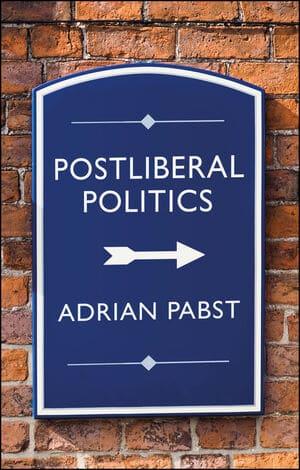 Postliberal Politics: The Coming Era of Renewal, Adrian Pabst (Cambridge, U.K.: Polity, 2021), 160 pp., cloth $69.95, paperback $19.95, eBook $16.
Postliberal Politics: The Coming Era of Renewal, Adrian Pabst (Cambridge, U.K.: Polity, 2021), 160 pp., cloth $69.95, paperback $19.95, eBook $16.
Postliberal Politics discusses a variety of ideas regarding systemic changes primarily to Western political systems that would allow these societies to move past traditional notions of liberalism into a postliberal politic that centers itself in the human need for community, belonging, and meaningful interpersonal connection. Much of the reflection offered in the book comes through the lens of the COVID-19 pandemic, and the systemic failures it has highlighted in political systems, institutions, and communities, as well as the basic realization that we are profoundly social beings who need meaningful connections in our lives. The aim of the book is to establish what postliberal politics should look like, and how significantly Western liberal institutions will need to change to make that a reality. Pabst manages to cover a lot of ground in this compact book, taking the reader on a whirlwind tour through chapters on social virtues, mutual obligations, democratic corporatism, and more.
His core theme resonates throughout: Contemporary Western liberal culture is seemingly incapable of forming and promoting universal values and virtues. Without creating a politic around commonalities, such as our need to be in communities, our interdependent relationships, and our desire for affection, we seem to be lost when it comes to promoting virtue. Trying to define the individual as something outside of the scope of his or her community is impossible, as it is the community that shapes the individual’s values. The community, therefore, must be seen not as a restraint on the individual but as necessary for one’s flourishing. The pandemic has revealed just how eager people truly are to renew a communitarian spirit of meaningful attachment to people, places, and communities.
Capitalism prizes not community but the commodification of all things all the time. Maximizing one’s free economic choice has overtaken our desire to mutually flourish and fulfill one another’s needs. Pabst chastises wealthy individuals for their indifference and apathy toward community building. Wealth, he argues, comes with duties and obligations, but most wealthy people shirk these duties at the prospect of becoming wealthier still. On the other end of the wealth spectrum, Pabst draws on care ethics to highlight how women conduct the vast majority of unpaid labor in society, including childcare, elder care, and so on. These tasks count as duties, and therefore should beget rights to protect those doing the unpaid labor. Pabst’s proposed solutions consistently return to the idea that we need to be thinking at the community level and about the dignity of individuals.
The book is not without its flaws, including an at-times-confusing organizational structure, as well as some misplaced jabs at Black Lives Matter and critical race theory. Nevertheless, Postliberal Politics is a great read for those who feel a bit lost or confused by the ever changing political, economic, and ecological climate. The book does not stop at the theoretical approach to tackling systemic issues, and proceeds to offer realistic and timely solutions to many of the problems we presently face. Among these problems is climate change, on which Pabst focuses one of the book’s final chapters. He argues that national development postpandemic needs to focus not only on economics but on ecology and sustainability; otherwise we will all but guarantee more frequent pandemics in the future, as we destroy natural habitats and bring animals closer to human populations. We owe it to ourselves and others to take these ideas seriously, seizing the initiative now, while we still can.
—Sarah Salkowski
Sarah Salkowski is a Master's student in Ethics, Peace, and Human Rights at American University in Washington, DC. Her research interests are social epistemology and applied ethics.
To access a PDF of this review, please visit Cambridge Core.
More in this issue
Winter 2021 (35.4) • Review
A Magna Carta for Children? Rethinking Children’s Rights
Children’s rights present a unique challenge. On the one hand, the UN Convention on the Rights of the Child (CRC) is the most widely ...

Winter 2021 (35.4) • Review Essay
Helping Refugees Where They Are
Some policies are not politically feasible. In the context of refugees, many claim it is not politically feasible to start admitting significantly more refugees into ...
Winter 2021 (35.4) • Review
Neither Settler nor Native: The Making and Unmaking of Permanent Minorities
The constitution of political community in the aftermath of colonialism was the foremost challenge for postcolonial leaders who had been shaped by anti-colonial struggles premised ...